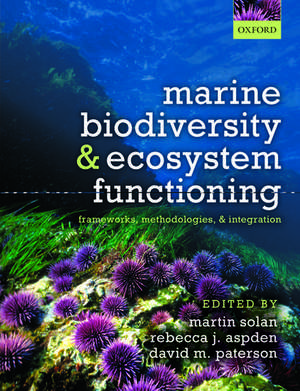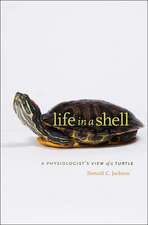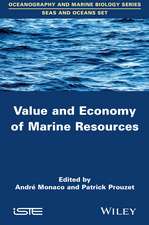Marine Biodiversity and Ecosystem Functioning: Frameworks, methodologies, and integration
Editat de Martin Solan, Rebecca J. Aspden, David M. Patersonen Limba Engleză Hardback – 18 iul 2012
| Toate formatele și edițiile | Preț | Express |
|---|---|---|
| Paperback (1) | 437.31 lei 31-37 zile | |
| Oxford University Press – 19 iul 2012 | 437.31 lei 31-37 zile | |
| Hardback (1) | 973.93 lei 6-8 săpt. | |
| OUP OXFORD – 18 iul 2012 | 973.93 lei 6-8 săpt. |
Preț: 973.93 lei
Preț vechi: 1264.84 lei
-23% Nou
Puncte Express: 1461
Preț estimativ în valută:
186.39€ • 192.55$ • 155.12£
186.39€ • 192.55$ • 155.12£
Carte tipărită la comandă
Livrare economică 25 martie-08 aprilie
Preluare comenzi: 021 569.72.76
Specificații
ISBN-13: 9780199642250
ISBN-10: 0199642257
Pagini: 254
Ilustrații: Numerous illustrations, plus a 4 page colour plate section
Dimensiuni: 197 x 247 x 17 mm
Greutate: 0.64 kg
Editura: OUP OXFORD
Colecția OUP Oxford
Locul publicării:Oxford, United Kingdom
ISBN-10: 0199642257
Pagini: 254
Ilustrații: Numerous illustrations, plus a 4 page colour plate section
Dimensiuni: 197 x 247 x 17 mm
Greutate: 0.64 kg
Editura: OUP OXFORD
Colecția OUP Oxford
Locul publicării:Oxford, United Kingdom
Notă biografică
Martin Solan is a marine benthic ecologist with broad interests in understanding biodiversity-environment interactions and the ecosystem consequences of altered diversity and environmental change. A key component of his research has been the development of in situ marine technology for the observation of organism-sediment relations, enabling changes in invertebrate behaviour to be related to environmental conditions at the temporal and spatial scales at which they occur. The technologies he uses have been instrumental in understanding the contribution of past and present benthic communities to ecosystem functioning and have informed the design of complex manipulative laboratory and field experiments that seek to understand the ecological consequences of species loss. In establishing this area of research, he has been influential in modifying approaches originally developed in terrestrial grassland systems for marine benthic environments. Beccy Aspden is currently a post doctoral research assistant at the University of St. Andrews, Scotland. She graduated from the University Plymouth in 2000 with a BSc in Marine Biology and Coastal Ecology. During August 2000 she carried out an internship at the Alfred Wegner Institute in Sylt, Germany, studying the effects of a tube building polychaete reef on the sediment and faunal diversities within and surrounding it. During the next 12 months she worked for a marine and freshwater consultancy agency (Unicomarine Ltd), during which she undertook the identification of invertebrate fauna found within samples taken for various contracts. These contracts included port development and dredging, coastal protection, fishery studies, and habitat surveys. Dr Aspden joined the Sediment Ecology Research Group (University St Andrews) in 2001 to complete her Ph.D.David Paterson is Head of the School of Biology at the University of St. Andrews and Director of the Sediment Ecology Research Group. He obtained his Ph.D. from the University of Bath in 1984 and was a Royal Society Research Fellow at the University of Bristol until moving to St Andrews. Professor Paterson has over 100 peer reviewed publications in the field of coastal ecology and dynamics and has interests in biodiversity, the ecology and dynamics of coastal depositional systems, ecosystem function and biofilm ecology.
Recenzii
I will highly recommend this book in its entirety to students, perticularly at postgraduate level, as well as researchers and practitioners with an interest and background in the field.
This book covers all you ever needed and/or wanted to know about biodiversity, and more specifically about the relationship between diversity and how the ecosystem functions in the marine environment.
This book covers all you ever needed and/or wanted to know about biodiversity, and more specifically about the relationship between diversity and how the ecosystem functions in the marine environment.











